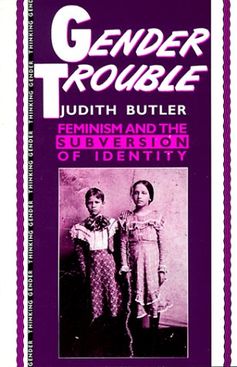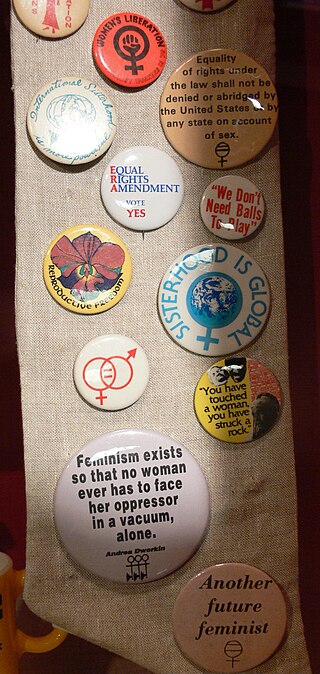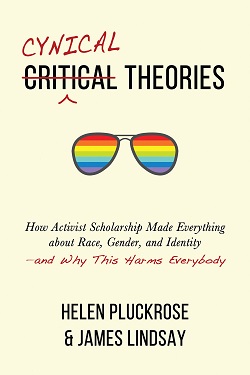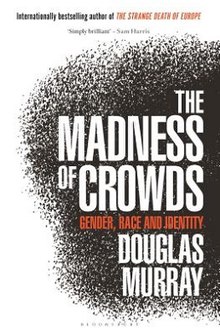Feminism is a range of socio-political movements and ideologies that aim to define and establish the political, economic, personal, and social equality of the sexes. Feminism holds the position that societies prioritize the male point of view and that women are treated unjustly in these societies. Efforts to change this include fighting against gender stereotypes and improving educational, professional, and interpersonal opportunities and outcomes for women.
Gender studies is an interdisciplinary academic field devoted to analysing gender identity and gendered representation. Gender studies originated in the field of women's studies, concerning women, feminism, gender, and politics. The field now overlaps with queer studies and men's studies. Its rise to prominence, especially in Western universities after 1990, coincided with the rise of deconstruction.
Identity politics is politics based on a particular identity, such as race, nationality, religion, gender, sexual orientation, social background, caste, and social class. The term could also encompass other social phenomena which are not commonly understood as exemplifying identity politics, such as governmental migration policy that regulates mobility based on identities, or far-right nationalist agendas of exclusion of national or ethnic others. For this reason, Kurzwelly, Pérez and Spiegel, who discuss several possible definitions of the term, argue that it is an analytically imprecise concept.
Liberal feminism, also called mainstream feminism, is a main branch of feminism defined by its focus on achieving gender equality through political and legal reform within the framework of liberal democracy and informed by a human rights perspective. It is often considered culturally progressive and economically center-right to center-left. As the oldest of the "Big Three" schools of feminist thought, liberal feminism has its roots in 19th century first-wave feminism seeking recognition of women as equal citizens, focusing particularly on women's suffrage and access to education, the effort associated with 19th century liberalism and progressivism. Liberal feminism "works within the structure of mainstream society to integrate women into that structure." Liberal feminism places great emphasis on the public world, especially laws, political institutions, education and working life, and considers the denial of equal legal and political rights as the main obstacle to equality. As such liberal feminists have worked to bring women into the political mainstream. Liberal feminism is inclusive and socially progressive, while broadly supporting existing institutions of power in liberal democratic societies, and is associated with centrism and reformism. Liberal feminism tends to be adopted by white middle-class women who do not disagree with the current social structure; Zhang and Rios found that liberal feminism with its focus on equality is viewed as the dominant and "default" form of feminism. Liberal feminism actively supports men's involvement in feminism and both women and men have always been active participants in the movement; progressive men had an important role alongside women in the struggle for equal political rights since the movement was launched in the 19th century.

Christina Marie Hoff Sommers is an American author and philosopher. Specializing in ethics, she is a resident scholar at the American Enterprise Institute. Sommers is known for her critique of contemporary feminism. Her work includes the books Who Stole Feminism? (1994) and The War Against Boys (2000). She also hosts a video blog called The Factual Feminist.

Gender Trouble: Feminism and the Subversion of Identity is a book by the philosopher Judith Butler in which the author argues that gender is performative, meaning that it is maintained, created or perpetuated by iterative repetitions when speaking and interacting with each other.
Postmodern feminism is a mix of post-structuralism, postmodernism, and French feminism. The goal of postmodern feminism is to destabilize the patriarchal norms entrenched in society that have led to gender inequality. Postmodern feminists seek to accomplish this goal through rejecting essentialism, philosophy, and universal truths in favor of embracing the differences that exist amongst women to demonstrate that not all women are the same. These ideologies are rejected by postmodern feminists because they believe if a universal truth is applied to all women of society, it minimizes individual experience, hence they warn women to be aware of ideas displayed as the norm in society since it may stem from masculine notions of how women should be portrayed.

Intersectionality is a sociological analytical framework for understanding how groups' and individuals' social and political identities result in unique combinations of discrimination and privilege. Examples of these factors include gender, caste, sex, race, ethnicity, class, sexuality, religion, disability, height, age, weight, species and physical appearance. These intersecting and overlapping social identities may be both empowering and oppressing. However, little good-quality quantitative research has been done to support or undermine the practical uses of intersectionality.

Nancy Fraser is an American philosopher, critical theorist, feminist, and the Henry A. and Louise Loeb Professor of Political and Social Science and professor of philosophy at The New School in New York City. Widely known for her critique of identity politics and her philosophical work on the concept of justice, Fraser is also a staunch critic of contemporary liberal feminism and its abandonment of social justice issues. Fraser holds honorary doctoral degrees from four universities in three countries, and won the 2010 Alfred Schutz Prize in Social Philosophy from the American Philosophical Association. She was President of the American Philosophical Association Eastern Division for the 2017–2018 term.
Linda Martín Alcoff is a Latin-American philosopher and professor of philosophy at Hunter College, City University of New York. Alcoff specializes in social epistemology, feminist philosophy, philosophy of race, decolonial theory and continental philosophy, especially the work of Michel Foucault. She has authored or edited more than a dozen books, including Visible Identities: Race, Gender, and the Self (2006), The Future of Whiteness (2015), and Rape and Resistance (2018). Her public philosophy writing has been published in The Guardian and The New York Times.
Omolara Ogundipe-Leslie, also known as Molara Ogundipe, was a Nigerian poet, critic, editor, feminist and activist. Considered one of the foremost writers on African feminism, gender studies and literary theory, she was a social critic who came to be recognized as a viable authority on African women among black feminists and feminists in general. She contributed the piece "Not Spinning on the Axis of Maleness" to the 1984 anthology Sisterhood Is Global: The International Women's Movement Anthology, edited by Robin Morgan. She is most celebrated for coining the term STIWA or Social Transformation in Africa Including Women.

Douglas Murray is a British author and political commentator widely described as far-right, although Murray denies this. He founded the Centre for Social Cohesion in 2007, which became part of the Henry Jackson Society, where he was associate director from 2011 to 2018. He is currently an associate editor of the conservative British political and cultural magazine The Spectator.

A variety of movements of feminist ideology have developed over the years. They vary in goals, strategies, and affiliations. They often overlap, and some feminists identify themselves with several branches of feminist thought.
Feminist political theory is an area of philosophy that focuses on understanding and critiquing the way political philosophy is usually construed and on articulating how political theory might be reconstructed in a way that advances feminist concerns. Feminist political theory combines aspects of both feminist theory and political theory in order to take a feminist approach to traditional questions within political philosophy.

Jordan Bernt Peterson is a Canadian psychologist, author, and media commentator. Often described as conservative, he began to receive widespread attention in the late 2010s for his views on cultural and political issues. Peterson has described himself as a classic British liberal and a traditionalist.

Who Stole Feminism? How Women Have Betrayed Women is a 1994 book about American feminism by Christina Hoff Sommers, a writer who was at that time a philosophy professor at Clark University. Sommers argues that there is a split between equity feminism and what she terms "gender feminism". Sommers contends that equity feminists seek equal legal rights for women and men, while gender feminists seek to counteract historical inequalities based on gender. Sommers argues that gender feminists have made false claims about issues such as anorexia and domestic battery and exerted a harmful influence on American college campuses. Who Stole Feminism? received wide attention for its attack on American feminism, and it was given highly polarized reviews divided between conservative and liberal commentators. Some reviewers praised the book, while others found it flawed.

The personal is political, also termed The private is political, is a political argument used as a rallying slogan of student movement and second-wave feminism from the late 1960s. In the context of the feminist movement of the 1960s and 1970s, it was a challenge to the nuclear family and family values. The phrase was popularized by the publication of a 1969 essay by feminist activist Carol Hanisch under the title "The Personal Is Political" in 1970, and has been repeatedly described as a defining characterization of second-wave feminism, radical feminism, women's studies, or feminism in general. It has also been used by some women artists as the underlying philosophy for their art practice.
The Madness of Crowds may refer to:
Alyson M. Cole is an American political scientist. She is a professor of Political Science, Women's and Gender Studies, and American Studies at Queens College, City University of New York and the CUNY Graduate Center, where she has also served as the Executive Officer of the political science program. Cole studies political philosophy and American culture, and has published works on the politics of victimhood and vulnerability in America, the politics of gender equality, and the nature of capitalism as a way of life.

Cynical Theories: How Activist Scholarship Made Everything About Race, Gender, and Identity—and Why This Harms Everybody is a nonfiction book by Helen Pluckrose and James Lindsay, published in August 2020. The book was listed on the bestsellers lists of Publishers Weekly, USA Today, and the Calgary Herald.










